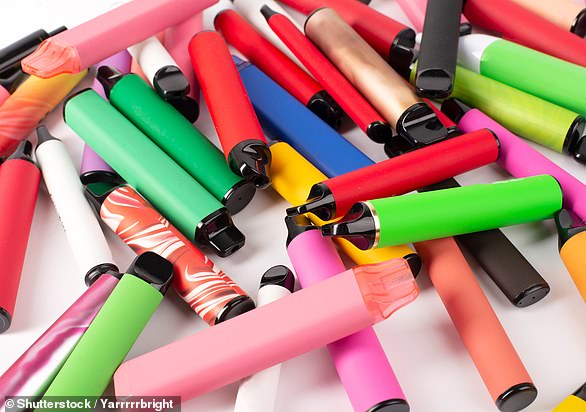Children as young as FOUR are being admitted to hospital from vaping: charities denounce ‘very worrying’ rise
Children as young as four are being admitted to hospital due to vaping, official figures show.
The revelation comes amid an eightfold increase in the number of under-20s needing treatment for the habit.
NHS England said doctors have seen a 276 per cent increase in the number of patients of all ages admitted for vaping-related conditions since 2020.
But rates among teens or younger increased more than twice as fast over the same period: by 733 percent.
Young people accounted for just 6 in 100 vaping-related admissions in 2020, rising to 14 in 100 last year, according to data released under freedom of information laws.
Health organizations described the findings as ‘very worrying’ as they urged non-smokers not to take up vaping and called on ministers to crack down on unscrupulous sellers.
Medics admitted 365 patients last year who had been harmed by vaping, including 50 children and 11 under the age of five.
This is an increase from just six children in 2020, none of whom were in preschool.
It comes days after a review by Public Health Wales recommended giving nicotine patches or chewing gum to children addicted to vaping.
NHS Digital data, based on the Smoking, Drinking and Drugs Among Young People in England Survey for the year 2021, showed that 30 per cent of children in Yorkshire and the Humber have used a vape
Teachers reported that students suffered from ‘cravings’ and ‘shaking’, leaving them unable to get through a lesson without losing focus and needing a nicotine kick.
Meanwhile, the Westminster government has announced it will soon ban e-cigarette packaging and flavors that appeal to children, to prevent them developing a habit.
Rishi Sunak has previously said it is ‘ridiculous’ that vaping is being promoted to children and he does not want his young daughters to be ‘tempted by these things’. Disposable vapes will also be banned because they are more affordable for children and are a drain on the environment.
Jonathan Grigg, professor of pediatric respiratory medicine at Queen Mary University of London, said: ‘This increase in hospital admissions is a completely predictable consequence of the government’s decision to allow vaping to be free for all – with flavors designed to be appealing to be for children and young people. people and the disastrous assumption that vaping has little or no adverse health impact.”
Sarah MacFadyen, head of policy and public affairs at Asthma + Lung UK, said the figures were ‘very worrying’.
She added: ‘Asthma + Lung UK emphasizes our position: it is already illegal to sell vapes to under-18s, and we strongly discourage non-smokers, especially children, from taking up vaping.
‘It is vital that the government takes action to prevent the vaping industry from marketing their products to children.
‘Enforcement of age-of-sale laws is also an issue and should be better funded so that young people do not have access to vaping.
“Our top priority is protecting the health of young people from the dangers of tobacco and preventing young people from taking up vaping.”
The figures show that 97 people were hospitalized with vaping-related conditions in 2020, including one 10- to 14-year-old and five 15-to-19-year-olds.
In 2021, 300 people were admitted, including 19 children, three of which were aged ten and under, and 16 aged 10 to 19.
In 2022 this increased to 457 people, including 50 children. There were 19 admissions among children aged four and under, two from 5 to 9 years, nine from 10 to 14 years and 20 from 15 to 19 years.
In 2023 the total was 365 – again with 50 children, of which 11 were toddlers, 12 were aged 10 to 14 years and 27 were aged 15 to 19 years.
Only January admissions figures have been released for 2024, with a total of 20, three of which were 19 years old or younger.
More women than men are now hospitalized for vaping problems. In 2020, 46 percent of admissions were women, last year this was 57 percent.

